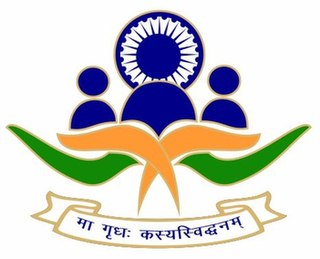
The Rajya Sabha, also known as the Council of States, is the upper house of the bicameral Parliament of India. As of 2023, it has a maximum membership of 245, of which 233 are elected by the legislatures of the states and union territories using single transferable votes through open ballots, while the president can appoint 12 members for their contributions to art, literature, science, and social service. The total allowed capacity is 250 according to article 80 of the Indian Constitution. The current potential seating capacity of the Rajya Sabha is 245, after the Jammu and Kashmir (Reorganisation) Act. The maximum seats of 250 members can be filled up at the discretion and requirements of the house of Rajya Sabha.

The Lok Sabha, also known as the House of the People, is the lower house of India's bicameral Parliament, with the upper house being the Rajya Sabha. Members of the Lok Sabha are elected by an adult universal suffrage and a first-past-the-post system to represent their respective constituencies, and they hold their seats for five years or until the body is dissolved by the president on the advice of the council of ministers. The house meets in the Lok Sabha Chambers of the Parliament House, New Delhi.

The Parliament of India or Indian Parliament, is the supreme legislative body of the Republic of India. It is a bicameral legislature composed of the Rajya Sabha and the Lok Sabha. The president of India, in their role as head of the legislature, has full powers to summon and prorogue either house of Parliament or to dissolve the Lok Sabha, but they can exercise these powers only upon the advice of the prime minister and the Union Council of Ministers.

The vice president of India is the deputy to the head of state of the Republic of India, i.e. the president of India. The office of vice president is the second-highest constitutional office after the president and ranks second in the order of precedence and first in the line of succession to the presidency. The vice president is also the ex officio chairman of the Rajya Sabha.
India has a parliamentary system as defined by its constitution, with power distributed between the union government and the states. India's democracy is the largest democracy in the world.

Lesbian, gay, bisexual, transgender, and queer (LGBTQ) people in India face legal and social challenges not experienced by non-LGBTQ people. There are no legal restrictions against gay sex within India. Same-sex couples have some limited cohabitation rights, colloquially known as live-in relationships. However, India does not currently provide for common-law marriage, same-sex marriage, civil union, guardianship, unregistered cohabitation or issue partnership certificates.

Sharad Yadav was an Indian politician from the Rashtriya Janata Dal (RJD) party. He was elected to the Lok Sabha seven times and to the Rajya Sabha four times from JD(U). He was the first national president of Janata Dal (United), serving from its formation in 2003 until 2016. He was disqualified from the Rajya Sabha in 2017 and removed from party leadership positions for engaging in anti-party activities.
The Unlawful Activities (Prevention) Act is an Indian law aimed at the prevention of unlawful activities associations in India. Its main objective was to make powers available for dealing with activities directed against the integrity and sovereignty of India. The most recent amendment of the law, the Unlawful Activities (Prevention) Amendment Act, 2019 has made it possible for the Union Government to designate individuals as terrorists without following any formal judicial process. UAPA is also known as the "Anti-terror law".

A Lokpal is an anti-corruption authority or body of ombudsman who represents the public interest in the Republic of India. The current Chairperson of Lokpal is Ajay Manikrao Khanwilkar. The Lokpal has jurisdiction over central government,anyone who is or has been Prime Minister, or a Minister in the Union government, or a Member of Parliament, as well as officials of the Union government under Groups A, B, C and D. Also covered are chairpersons, members, officers and directors of any board, corporation, society, trust or autonomous body either established by an Act of Parliament or wholly or partly funded by the Centre. It also covers any society or trust or body that receives foreign contributions above ₹10 lakh. to inquire into allegations of corruption against its public functionaries and for matters connected to corruption. The Lokpal and Lokayuktas Act was passed in 2013 with amendments in parliament, following the Jan Lokpal movement led by Anna Hazare in 2010. The Lokpal is responsible for enquiring into corruption charges at the national level while the Lokayukta performs the same function at the state level. The age of Lokpal on the date of assuming office as the chairperson or a member should not be less than 45 years.
Tiruchi Siva is a member of the Parliament of India representing Tamil Nadu in the Rajya Sabha, the upper house of parliament. He is from the Dravida Munnetra Kazhagam party, and was elected in 1996, 2002, 2007, 2014 and 2020. He is a speaker and a writer.
The Jan Lokpal Bill, also referred to as the Citizen's Ombudsman Bill, was a bill drawn up by civil society activists in India seeking the appointment of a Jan Lokpal, an independent body to investigate corruption cases and complete the investigation within a year for envisaging trial in the case getting completed within one year.
Whistle Blowers Protection Act, 2011 is an Act of the Parliament of India which provides a mechanism to investigate alleged corruption and misuse of power by public servants and also protect anyone who exposes alleged wrongdoing in government bodies, projects and offices. The wrongdoing might be in the form of fraud, corruption or mismanagement. The Act will also ensure punishment for false or frivolous complaints.
The Lokpal and Lokayuktas Act, 2013, commonly known as The Lokpal Act, is an anti-corruption Act of Indian Parliament in India which "seeks to provide for the establishment of the institution of Lokpal to inquire into allegations of corruption against certain important public functionaries including the Prime Minister, cabinet ministers, members of parliament, Group A officials of the Central Government and for matters connecting them".
Juvenile Justice Act, 2015 has been passed by Parliament of India amidst intense controversy, debate, and protest on many of its provisions by Child Rights fraternity. It replaced the Indian juvenile delinquency law, Juvenile Justice Act, 2000, and allows for juveniles in conflict with Law in the age group of 16–18, involved in Heinous Offences, to be tried as adults. The Act also sought to create a universally accessible adoption law for India, overtaking the Hindu Adoptions and Maintenance Act (1956) and the Guardians and Wards Act (1890), though not replacing them. The Act came into force from 15 January 2016.
The Rights of Transgender Persons Bill, 2014 is a proposed Act of the Parliament of India which seeks to end the discrimination faced by transgender people in India. The Bill was passed by the upper house Rajya Sabha on 24 April 2015. It was introduced in the lower house Lok Sabha on 26 February 2016.

Gopi Shankar Madurai is an Indian equal rights and Indigenous rights activist. Shankar was one of the youngest, and the first openly intersex and genderqueer statutory authority and one of the candidates to contest in 2016 Tamil Nadu Legislative Assembly election. Shankar is also the founder of Srishti Madurai Student Volunteer Collective. Shankar's work inspired the Madras High Court to direct the Government of Tamil Nadu to order a ban on forced sex-selective surgeries on intersex infants. In December 2017, Shankar was elected to the executive board of ILGA Asia. In August 2020, the Ministry of Social Justice and Empowerment appointed Shankar as the South Regional representative in the National Council for Transgender Persons.Shankar introduced the "others" option in the sex column of application forms for political parties and central universities, including Jawaharlal Nehru University. Shankar was also instrumental in granting civil rights for transgender persons, including pilot licenses for transmen and property inheritance rights for transwomen. Additionally, the Juvenile Justice Committee and POCSO Committee seek Shankar’s advice on issues related to the infancy and childhood of infants and children born with diverse sex characteristics.
Kolkata Rainbow Pride Walk (KRPW) is the oldest pride walk in India and South Asia. The first march in Kolkata was organised on 2 July 1999. The walk was called The Friendship Walk. Kolkata was chosen as the first city in India to host the march owing to Kolkata's history of movements for human and Political Rights. Currently, Kolkata Rainbow Pride Walk is organised by the Kolkata Rainbow Pride Festival (KRPF).

The Muslim Women Act, 2019 is an Act of the Parliament of India criminalising triple talaq. In August 2017, the Supreme Court of India declared triple talaq, which enables Muslim men to instantly divorce their wives, to be unconstitutional. The minority opinion suggested the Parliament to consider appropriate legislation governing triple talaq in the Muslim community.
The Human Immunodeficiency Virus and Acquired Immune Deficiency Syndrome Act, 2017, often shortened to the HIV/AIDS Prevention Act, is an act of the Parliament of India that provides for controlling and preventing of HIV/AIDS and securing the rights of individuals diagnosed with HIV/AIDS. The bill for the act was introduced in the Rajya Sabha on 11 February 2014 and was referred to a Standing Committee on 24 February 2014, which submitted its report on 29 April 2015. After few amendments to the original 2014 bill, it was passed by the Rajya Sabh on 21 March 2017 and the Lok Sabha on 11 April 2017. It received Presidential assent on 20 April 2017, and became effective from 10 September 2018. The HIV/AIDS Prevention Act originated from a draft bill submitted by Lawyers Collective, a non-governmental organization, to the National AIDS Control Organisation (NACO) in 2006. The act penalises propagation of hate against HIV/AIDS affected persons, ensures the right of HIV/AIDS affected minors to shared household, protects non-disclosure of HIV/AIDS status in the absence of court order and mandates informed consent to disclose HIV/AIDS positive identity, inter alia. However, civil society organisations and HIV/AIDS affected persons criticised the act on certain legal language issues, as it mandates the state to provide HIV/AIDS affected persons with medical services "as far as possible". This aspect was absent from the draft bill submitted to NACO.
The Citizenship (Amendment) Act, 2019 (CAA) was passed by the Parliament of India on 11 December 2019. It amended the Citizenship Act, 1955 by providing an accelerated pathway to Indian citizenship for persecuted religious minorities from Afghanistan, Bangladesh and Pakistan who arrived in India by 2014. The eligible minorities were stated as Hindus, Sikhs, Buddhists, Jains, Parsis or Christians. The law does not grant such eligibility to Muslims from these countries. Additionally, the act excludes 58,000 Sri Lankan Tamil refugees, who have lived in India since the 1980s. The act was the first time that religion had been overtly used as a criterion for citizenship under Indian law, and it attracted global criticism.










